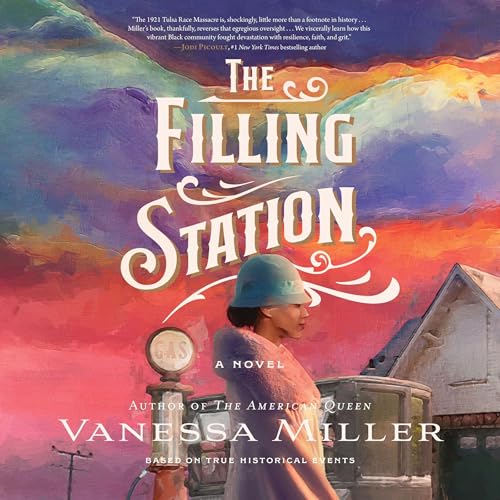
The Filling Station
A USA TODAY Bestselling Historical Fiction Novel about the Tulsa Race Massacre
Falha ao colocar no Carrinho.
Falha ao adicionar à Lista de Desejos.
Falha ao remover da Lista de Desejos
Falha ao adicionar à Biblioteca
Falha ao seguir podcast
Falha ao parar de seguir podcast
Assine e ganhe 30% de desconto neste título
Compre agora por R$ 92,99
-
Narrado por:
-
Angel Pean
-
De:
-
Vanessa Miller
Sobre este título
A USA TODAY BESTSELLER! · A LIBRARY JOURNAL BEST BOOKS OF 2025 PICK · A BOOKLIST EDITORS' CHOICE PICK FOR 2025 · A heart wrenching and hopeful novel from the bestselling author of The American Queen
"Absolutely worthy." --Booklist, starred review
"Should be required reading." --Library Journal, starred review
"Resilience, faith, and grit." --Jodi Picoult, #1 New York Times bestselling author
Two sisters. One unassuming haven. Endless opportunities for grace.
Sisters Margaret and Evelyn Justice have grown up in the prosperous Greenwood District of Tulsa, Oklahoma--also known as Black Wall Street. In Greenwood, the Justice sisters had it all--movie theaters and entertainment venues, beauty shops and clothing stores, high-profile businesses like law offices, medical clinics, and banks. While Evelyn aspires to head off to the East Coast to study fashion design, recent college grad Margaret plans to settle in Greenwood, teaching at the local high school and eventually raising a family.
Then the 1921 Tulsa Race Massacre upends everything they know and brings them unspeakable loss. Left with nothing but each other, the sisters flee along what would eventually become iconic Route 66 and stumble upon the Threatt Filling Station, a safe haven and the only place where they can find a shred of hope in oppressive Jim Crow America. At the filling station, they are able to process their pain, fill up their souls, and find strength as they wrestle with a faith in God that has left them feeling abandoned.
But they eventually realize that they can't hide out at the filling station when Greenwood needs to be rebuilt. The search for their father and their former life may not give them easy answers, but it can propel them--and their community--to a place where their voices are stronger . . . strong enough to build a future that honors the legacy of those who were lost.
The Filling Station weaves together themes of love, hate, hope, trust, and resilience in the face of great turmoil. With every turn of the page, you will be transported into a story about strong Black women in a pivotal moment of history.
Discussion questions are included, so it's perfect for book clubs! Keep your tissues nearby because this one is practically guaranteed to make you feel all the feelings.
Audio read by Angel Pean, narrator of Junie: A GMA Book Club Pick.



